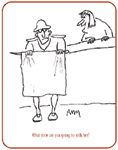Mind Over Miller: Confronting the urban mentality
When I was a boy, most Americans resided in rural communities. And most of our schoolbooks, probably written in the late 19th century, featured stories about cows, milkmaids, geese, Chicken Little, cornfields, and so on.
When I was a boy, most Americans resided in rural communities. And most of our schoolbooks, probably written in the late 19th century, featured stories about cows, milkmaids, geese, Chicken Little, cornfields, and so on. Today's children, however, often grow up having no idea where milk, eggs, or hamburgers come from. Ask them, and they'll likely say "the supermarket." Beyond that, they simply don't know.
Recently, I mentioned to a young urban lawyer that the water supply at my home came from a well. He was astounded. "You mean you don't have faucets?" he asked.

Dr. Robert M. Miller
"Of course I have faucets," I answered.
"But how does the water get from the bucket in the well to your faucet?"
And he's an attorney! My neighbor met a building official who asked a similar question, "How do you get the water from the well to your house? Do you siphon it?"

What time are you going to milk her?
These exchanges provide insight into the urban mentality—the mentality of city-reared people who have no understanding of nature or animal life or where their food comes from. I encounter the urban mentality all the time. Here are a few examples:
- At a fair, a Holstein is calving; the calf's head is presented. A young man calls to his wife and children, "Hey, come here. This is amazing! A cow with a head at each end." I explain that the cow is calving. When the young man doesn't seem to understand, I tell him it's having a baby. "Oh. Oh! Never mind, honey. Keep the children away."
- Viewing a 4-H Club calf: "Look, a midget cow!"
- After a long and careful study of a mature Brahman bull: "When are they going to milk her?"
- Conversation about a cow at the fair: "What are those things growing out of its head?"
"Those are horns."
"Is it a boy or a girl?"
"It's a heifer—a girl."
"I thought only boys had horns."
This urban mentality helps explain some of the questions and comments we encounter in practice. For example:
- A man with three children brings in a male dog for rabies vaccination. The man refers to the shorthaired dog as "she." I point out that she is male.
"What?" he asks.
"She is a male dog," I explain.
"Oh, I don't know anything about dogs."
- Advised to feed an orphaned lamb cow's milk: "Cow's milk? Where am I going to get that? I've seen goat's milk in the market but never cow's milk."
- Question over the phone: "My cat is stiff, doesn't move, and has flies all over it. Should I make an appointment?"
Robert M. Miller, DVM, is an author and a cartoonist, speaker, and Veterinary Medicine Practitioner Advisory Board member from Thousand Oaks, Calif. His thoughts in "Mind Over Miller" are drawn from 32 years as a mixed-animal practitioner. Visit his Web site at www.robertmmiller.com.